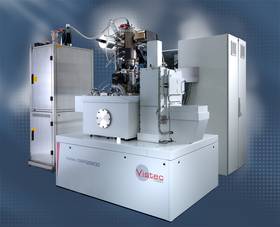Jun 16 2011
Vistec Lithography, Inc., a leading supplier of Electron Beam Lithography systems, has received an order for one of its EBPG5200 systems from the University of California, San Diego.
The Vistec EBPG5200 will be installed in the Nano3 cleanroom facility at the California Institute for Telecommunications and Information Technology (Calit2) and will be used for nano- and microfabrication enabling basic and applied research and development for hundreds of academic and industrial users.
The extension of the facility was enabled by funding from the Major Research Instrumentation (MRI-R2) program of the National Science Foundation (NSF) and with contributions from UC San Diego, its Jacobs School of Engineering, Department of Electrical and Computer Engineering, the UC San Diego School of Medicine, and Calit2/Nano3.

The Nano3 facility provides a synergistic environment for fundamental research and development efforts at the nanoscale with a focus on Nanoscience, Nanoengineering and Nanomedicine. In addition to providing essential nanofabrication capabilities for research on electronic and photonic materials and devices, Nano3 facilitates the pursuit of research in emerging, interdisciplinary and rapidly growing fields such as biomedical and biochemical devices, monolithic and heterogeneous integrated electronic and photonic devices and circuits, and sensor technology.
"We are looking forward to working with a high-performance instrument such as Vistec's EBPG5200 system," said UC San Diego electrical and computer engineering Professor Shaya Fainman, principal investigator on the NSF
MRI-R2 proposal. "It will enable us to make major advances in nanoscale science and technology research and it will also fundamentally strengthen the research environment of the university as a whole in these emerging fields."
While the initial utilization will primarily be in the research areas of nanophotonics for intra-chip communication, nanomagnetics for data storage, and tissue engineering for biomedical applications, numerous other ongoing projects will also benefit from the acquisition. These include radio frequency micro- and nanoelectro-mechanical systems; the study of novel photonic phenomena at the interface between the classical and quantum regimes of thermo-electric materials and nanoscale electronic devices; development of tools for 1x nanometer-resolution metrology; synthesis of negative index metamaterials; and metamaterials for biomedical sensing and energy harvesting.
"Referring back to a field-proven evolution, the Vistec EBPG5200 is the perfect match to these demands," explained Rainer Schmid, General Manager at Vistec Lithography, Inc. The EBPG5200 system is equipped with a 50MHz pattern generator and full 20bit address technology. As a special characteristic, the system is able to operate with 20, 50 and 100kV accelerating voltage. "Thanks to its high resolution and beam stability, our system is set to routinely generate structures less than 8nm on varying substrates sizes enabling full patterning across a 200mm diameter," added Schmid. "Furthermore, the system can be used by 'multi user environments'
due to its interactive graphical user interface."
After having installed a large number of electron-beam lithography systems across the United States, the order from UC San Diego is another major step in Vistec's long-term strategy. Said Schmid: "We are aiming to become first choice for Universities and Research Institutions across the US, when it comes to nano research equipment. We are very pleased to have received an order from a university of such a high reputation."